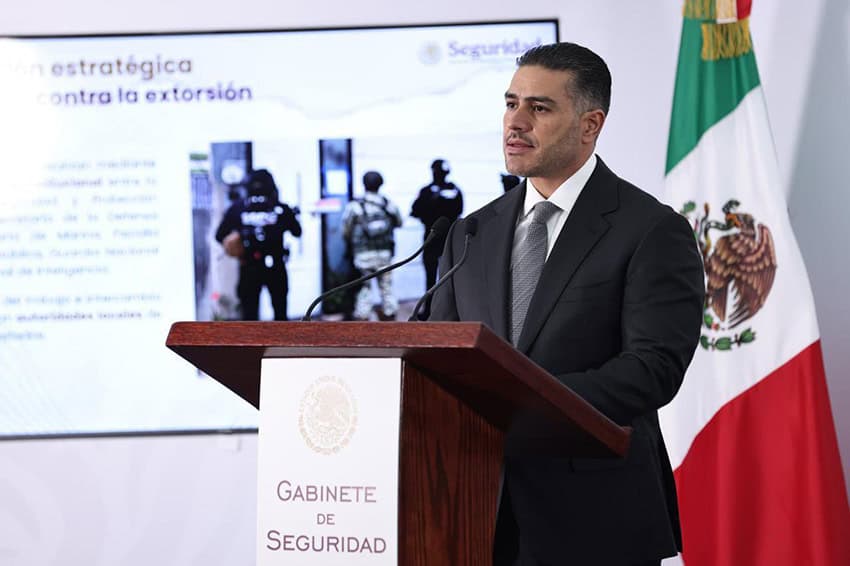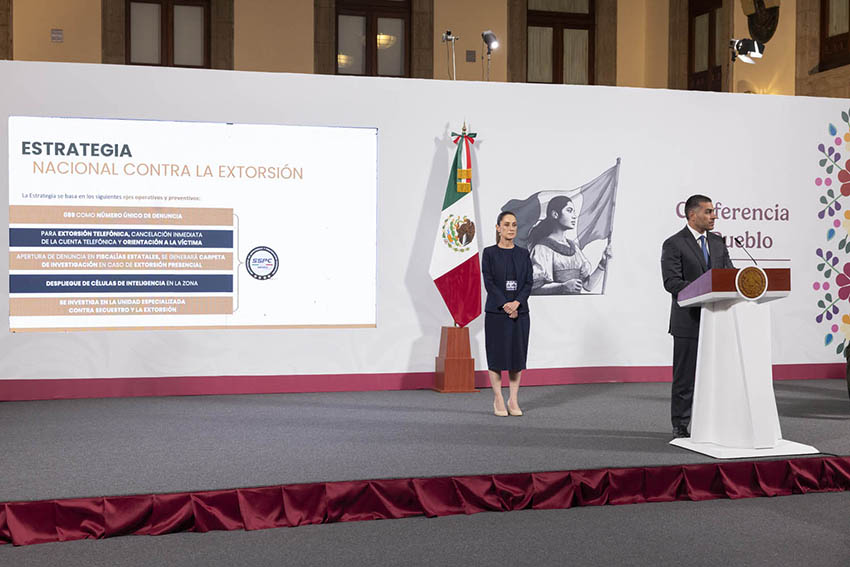The federal government is ramping up its fight against extortion, a crime whose incidence has increased more than 80% in the space of a decade.
Security Minister Omar García Harfuch presented a new national strategy against extortion on Sunday, while President Claudia Sheinbaum on Tuesday submitted a constitutional reform proposal to Congress that, if approved, will allow the legislature to establish a General Law Against Extortion.

The strategy presented by García Harfuch is based on five core tenets:
- Making extortion-related arrests as a result of investigation and intelligence.
- The creation of state-based anti-extortion units.
- The application of the “victim assistance” protocol by officials attending to victims of extortion.
- The training of extortion line telephone operators in crisis management and negotiation.
- The implementation of a national extortion prevention campaign.
The launch of the new strategy comes after a total of 4,882 people became victims of extortion in the first five months of 2025, according to official data. That figure represents a 5% increase compared to the same period of last year, and an 82.3% increase compared to the first five months of 2015.
The real number of extortion victims in any given period is much, much, higher as the vast majority of cases go unreported, mainly due to fear of reprisal. According to Francisco Rivas, general director of the National Citizens’ Observatory, more than 99% of acts of extortion are not reported to authorities.
The crime is perpetrated in a range of ways including over the telephone, online and in person. Criminal groups often target small businesses, forcing them to make regular payments known as derecho de piso (or cobro de piso). Farmers, including lime and avocado growers, are also frequent victims of extortion.
People who refuse to make payments to extortionists run the risk of becoming victims of even worse crimes, such as kidnapping and murder.
García Harfuch: ‘We have the task of combating extortion with the strength of the state’
García Harfuch outlined the national strategy against extortion at a press conference on Sunday.
“In this administration, on the instructions of President Claudia Sheinbaum, we have the task of combating extortion with the strength of the institutions of the state,” the security minister said.
He said that detaining extortionists is “a direct way to protect the livelihoods of thousands of working families who, every day, with effort and honesty, build businesses, cultivate the land, transport goods and provide services.”
García Harfuch also said that “extortion is one of the crimes that causes the most damage to society.”
“It doesn’t just compromise people’s safety, but also harms their economic stability and affects their emotional health,” he said.

Accompanied by the chiefs of the Mexican Army, Navy and National Guard, and Attorney General Alejandro Gertz Manero, García Harfuch said that the new anti-extortion strategy is possible thanks to the approval of the National Investigation and Intelligence System Law, which passed the Senate last week.
He said that the law will allow authorities to strengthen their investigations into extortion and increase their capacity to dismantle criminal groups dedicated to the crime.
The National Guard, the army, the navy, the Federal Attorney General’s Office, the Finance Ministry’s Financial Intelligence Unit (UIF) and state and municipal authorities will all participate in the fight against extortion, García Harfuch said.
The UIF will focus on investigations aimed at the freezing of bank accounts where the proceeds of extortion are deposited. Authorities will also seek court orders to block telephone numbers used to commit acts of extortion, including, in some cases, by prisoners.
According to a government statement, authorities will carry out “surprise operations in penitentiary centers” aimed at seizing telephone equipment used by prisoners to commit extortion.
Gertz Manero said that authorities already have knowledge of prisons where so-called extortion call centers operate.

“We have identified the jails where telephone extortion [schemes] operate. We’re going to file complaints … against any implicated person and each month we’ll publicly report which penitentiary centers are involved,” he said.
The federal attorney general also said that he would meet with his state counterparts on Aug. 1 to discuss the establishment of “a common information system” in which details of reports of extortion will be stored.
Victims of extortion can report the crime and receive assistance from telephone operators by calling the government’s extortion hotline on 089. Anyone reporting an act of extortion has the right to remain anonymous if they wish.
According to García Harfuch, cashiers at convenience stores and banks will be given training to help them identify and “prevent” deposits by extortionists. Hotel receptionists will be given training to “identify and avoid cases of virtual kidnapping.”
García Harfuch said that the federal government will collaborate with the private sector on the training initiatives.
The government said in its statement that a “preventive campaign” will be disseminated via “institutional channels” so that all Mexicans “can be protected” from the crime of extortion.
66% of acts of extortion reported in just 8 states
García Harfuch said that 66% of acts of extortion reported during the current term of government occurred in just eight states: México state, Guanajuato, Mexico City, Nuevo León, Veracruz, Jalisco, Michoacán and Guerrero.
The implementation of the anti-extortion strategy will be prioritized in these states “with multidisciplinary attention” to the crime and the deployment of “specialized work teams,” he said.

Yair Mendoza, a security researcher at the think tank México Evalúa, told the news outlet Animal Político that citizens will be able to assess whether the strategy is working by the end of this year.
An indication of success, he said, would be a decrease in extortion, “at least in the federal entities” with the highest incidence of the crime.
General Law against Extortion will oblige states to investigate the crime, even without a victim’s complaint
Sheinbaum’s top legal adviser, Ernestina Godoy, told reporters on Tuesday that the president would sign on Tuesday an “initiative directed to the Congress of the Union” aimed at giving the legislature the “necessary constitutional powers” to draw up “general legislation” that establishes a uniform definition of extortion across Mexico and uniform penalties for those convicted of committing the crime.
Speaking at Sheinbaum’s morning press conference, Godoy said that the proposed General Law against Extortion will establish “very clearly” that extortion must be “prosecuted ex officio” across all 32 federal entities.
That means that state authorities will be required to investigate and prosecute the crime of extortion without the need for formal complaints from victims to be filed first.
Speaking after Godoy, Sheinbaum acknowledged that extortion is a crime “that we haven’t been able to reduce.”
“… So, on Sunday we presented the national strategy against extortion and today we strengthen it,” she said.

Sheinbaum said that as things stand, “it’s the victim who has to report extortion” and in doing so places his or her life at risk.
“So we’re removing that burden from the victim. Who assumes it? The Mexican state,” she said, noting that authorities will have to investigate and prosecute extortion “ex officio,” or on their own initiative, once the General Law against Extortion takes effect.
All of us are the victim. The victim is the state,” Sheinbaum said.
“Why does the Constitution need to be amended? Because there must be the same law for the entire country in order for this to be possible. … A general law means that it covers all states, and that all states are required to legislate in accordance with the general law,” she said.
“In order to have a General Law against Extortion, the Constitution must be amended regarding the powers of Congress. Congress will be able to draw up a General Law against Extortion because of the constitutional amendment we are going to make,” said Sheinbaum, who confirmed she was sending her constitutional reform proposal to Congress on Tuesday.
The ruling Morena party and its allies have a supermajority in the lower house of Congress and a near-supermajority in the Senate, meaning that the president’s proposed constitutional reform will almost certainly be approved, allowing lawmakers to create the General Law against Extortion.
Sheinbaum said she believed that all political parties will support the initiative, declaring that she doesn’t see “why anyone wouldn’t agree.”
She anticipated that the constitutional reform and the General Law against Extortion will be approved before the end of the year.
Once the law takes effect, “all the states must prosecute [extortion] ex officio, like a homicide, for example,” Sheinbaum said.
“… We’re starting with the 089 [extortion hotline], with the [national] strategy [against extortion], and it will be strengthened with the changes to the laws this year,” she said.
With reports from El Economista, La Jornada, El Universal and Animal Político
